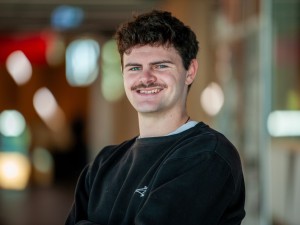Imogen McNeill
|
|
PROJECT SUMMARY
Dinogunellins are a class of four toxic phospholipids found in the roe of four fish with a unique and modular structure. To date, they have only been extracted rather than synthesised, resulting in small quantities of compound and limiting the ability to test their properties. This project aims to build on ongoing research in the Green group by utilising a click-chemistry approach to synthesise a library of dinogunellin analogues and subsequently test their biological activity. As numerous other toxic natural compounds have demonstrated biological activity and drug-like properties, dinogunellins and analogues are anticipated to behave similarly, and therefore show serious promise as a starting point for developing drugs to fight infectious diseases.
RESEARCH IMPACT
New Zealand will always have to face serious infectious disease threats and will therefore require a range of effective drugs for these situations. Dinogunellins have a unique structure, especially with regard to the phosphoramidate bond, that strongly suggests that analogues will be biologically active and possess drug-like properties. Synthesis of a variety of analogues with the aim of finding a drug lead is a critical step in developing our understanding of these compounds. Moreover, the widespread availability of the starting materials necessary means that synthesis of dinogunellin analogues will not be limited by rarity or expense of the required building blocks. Combined with the straightforward click chemistry approach, the synthesis of these potentially very useful compounds is uncomplicated, easily replicated, and therefore remarkably useful for New Zealand's ability to respond to infectious disease threats.
RESEARCH PERSONNEL
- Dr Nick Green | Supervisor
Claudia Priddey
|
 |
PROJECT SUMMARY
Acute respiratory infections are the most common reason preschool-aged children present to primary care and are the most frequent cause of hospital admission in this age group. Within New Zealand, acute respiratory infection hospital admission rates are higher for tamariki Māori and for Pacific children and children living in socioeconomically deprived households.
Many acute respiratory infection hospitalisations are preventable or avoidable by access to high quality preventive and primary care. Access to such care varies greatly between population groups in New Zealand. One group with notably poorer access are rural Māori.
The aims of this project are to:
- To engage with waahine Māori at one or more kōhanga reo in the Waikato region.
- To engage in kōrero with these wāhine to gain an understanding of their experiences with chest infections in their tamariki and of their healthcare access decision making and utilisation.
- To use this information to help inform the development of child health services in the Waikato region.
This project will be conducted within the ARROW study. It will utilise qualitative research methodologies.
RESEARCH IMPACT
The ARROW study is a clinical trial of a novel intervention that aims to prevent recurrent hospital admissions for wheezy chest infections. Te Niwha are funding a community and primary care component of this project in the Waikato, Auckland and Bay of Plenty region.
Wheezy chest infections are a very frequent cause of visits to GP practices and to hospitals. For Māori children wheezy chest infections are a more frequent cause of hospital admission than non-Māori children. Is this because of barriers to them accessing primary care or due to the quality of the primary care they receive?
This project will help our understanding of how healthcare is accessed by wāhine Māori for their tamariki nohinohi. This will help inform the development of healthcare delivery in the north Waikato region. This region is acknowledged by the children’s health team at Waikato Hospital as being one where healthcare delivery needs to be improved.
We aim to submit a draft/summary of the project findings in June 2025. This date aligns with the milestones and deliverables of the parent project (ARROW).
RESEARCH PERSONNEL
- Prof Cameron Grant | Primary Supervisor
- Dr Simone Watkins | Supervisor
- Marisa van Arragon | Supervisor
Myles Landon
|
 |
PROJECT SUMMARY
Malonyl-CoA Decarboxylase (MCD) is a crucial enzyme in the fatty acid biochemical pathway. MCD is responsible for the breakdown of malonyl-CoA to acetyl-CoA, which can be synthesised into new fatty acids and ultimately energy production. The regulation of MCD is highly integral to one’s health in controlling the concentrations of malonyl-CoA present within a cell. A mutated or defunct MCD can lead to serious health problems as the synthesis and transport processes for fatty acids will be stopped, leading to a lack of energy production and a build-up of fats, toxins, and waste products that can severely impact the cardiovascular system.
Coacervates are membranelles organelles that localise enzymes and their substrates to increase their relative concentrations and thus improve catalytic activity. Incorporating MCD and malonyl-CoA inside a coacervate increases the reaction leading to an increase in the fatty-acid biochemical pathways.
This project will give great insights into how coacervates can alter catalytic reactivity to be used in further health research.
RESEARCH IMPACT
This project aligns with Te Niwha's mission to ensure that Aotearoa has world-class research facilities and the capability to respond to the sudden event of an infectious disease threat. It is important for us here in Aotearoa as a small relatively isolated country to stay connected to and at the forefront of global health research. Using coacervates in the medical sector is very new and largely unexplored. This project will aim to provide critical research information on how enzymes such as MCD can be integrated with coacervates to alter catalytic activity, with the potential of being used in a medical sense to aid in both protection and recovery from enzyme-targeting diseases. This project will aim to ensure that our response to an infectious disease is treated equally among ethnicities and will take the diversity of our country, and the different effects diseases can have on our community into account. The critical information gathered by this research will be shared with the scientific community, with a particular focus on the Maori community to ensure that the knowledge can be applied throughout all our communities.
RESEARCH PERSONNEL
- Prof Renwick Dobson | Primary Supervisor
- Dr Natalia (Amy) Yewdall | Supervisor
Abigail Kalontano
|
 |
PROJECT SUMMARY
The Medical Research Institute of New Zealand (MRINZ) is currently conducting an observational feasibility study in Aotearoa. Community pharmacies are mirroring the ESR-led GP sentinel surveillance programme, where pharmacy patients with influenza-like illness are invited to have a nasopharyngeal swab for viral testing.
Activities include literature review, scoping existing pharmacy and research infrastructure, and building international research connections. This project will involve research into the regulatory and ethical research requirements to run observational clinical trials in Pacific Island countries, as well as identifying funding opportunities for a future clinical trial in Pacific Island countries.
RESEARCH IMPACT
This project has the potential to enhance clinical research and strengthen national public health responses in Aotearoa and the wider Pacific by:
- Exploring the feasibility of extending the respiratory surveillance program into the Pacific islands, helping establish essential public health surveillance systems in regions with limited research infrastructure. This could contribute to early detection of respiratory threat, improving response time and overall health outcomes for the pacific regions.
- Supporting the development of sustainable research capabilities through assessment of the pharmacy and research infrastructure in the Pacific Islands, promoting cross-border collaboration that will enhance both local and regional public health efforts.
- By investigating the ethical and regulatory requirements for conducting clinical trials in the Pacific Islands, this project will contribute to the development of culturally appropriate and region-specific guidelines.
- The identification of funding opportunities for expanding the surveillance study into the Pacific Islands will lay the foundation for sustainable, long-term research projects that address respiratory health issues in underserved regions. This could lead to continued collaboration and the development of additional studies, enhancing the global understanding of respiratory diseases.
RESEARCH PERSONNEL
- Dr Gabby Shortt | Primary Supervisor
- Melemafi Porter | Supervisor
Paepa Tohaia
Ōtākou Whakaihu Waka / University of OtagoProject title: Online maps for immunisation: Are they fit for purpose? |
PROJECT SUMMARY
This summer studentship aims to improve maternal immunisation coverage among Māori and Pacific hapū māmā, addressing significant health inequities in Aotearoa. Grounded in a Kaupapa Māori methodology, the project uses data that was collected from communities in Porirua and Gisborne to understand their specific vaccination needs and challenges. The research involves analysing data that were collected though key stakeholder interviews with midwives, nurses, immunisation coordinators, policy analysts and focus group hui with hapū māmā, ensuring that Māori and Pacific voices are prioritized throughout. This summer studentship will use direct content analysis of interview data to determine if online maps, that show where hapū māmā can be vaccinated, can be improved. By working with communities, the project seeks to develop effective strategies to enhance vaccine uptake and ultimately improve health outcomes for mothers and their pēpi. Additionally, providing improvement recommendations required for online maps of maternal vaccination providers will help focus website improvements to facilitate access to immunisation services, helping to establish a more robust vaccination framework that can be adapted during public health crises.
RESEARCH IMPACT
The research aims to address the health inequities faced by Māori and Pacific hapū māmā with regard to maternal immunisation coverage. The online maps will empower hapū māmā to access immunisation services more easily, thereby improving health outcomes for mothers and their pēpi. This will lead to more equitable access to preventative health services and reduce the high risks associated with infectious diseases. The expected outcomes of the project include increased maternal immunisation rates among Māori and Pacific communities and the enhancement of a user-friendly online map that can be used to guide hapū māmā in accessing vaccination services. By establishing a reliable maternal immunisation framework this project supports Te Niwha’s mission of building a world-class response to infectious disease threats. This framework not only addresses maternal health during non-pandemic times but also provides a foundation for rapid response during health crises, such as pandemics.
RESEARCH PERSONNEL
- Dr Gabrielle McDonald | Primary Supervisor
- Dr Amber Young | Supervisor
PUBLICATION
>> Are Online Maps and Booking Systems for Antenatal Vaccination Fit for Purpose? A Qualitative Study
Paepa Tohaia, Amber Young, Esther Willing , Louise Fangupo, Gabrielle McDonald

